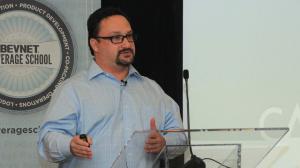Bill Sipper addresses Philly’s Soda Tax impact on the soda industry
The Philadelphia Soda Tax is a controversial, highly divisive tax. Beverage industry analyst and commentator, William Sipper weighs in on the early results.
RAMSEY, NEW JERSEY, UNITED STATES, November 9, 2017 /EINPresswire.com/ -- Bill Sipper is one of the world’s leading experts in the beverage industry. At the beginning of his long career he was instrumental in promoting Evian Natural Spring Water into a major brand in the U.S. Since then he has held senior-level positions at some of the top beverage marketers in the world. He has helped many brands to develop their products and extend their reach.One of these was Fresh Samantha, the first east coast bottled smoothie company which eventually merged with Odwalla and was sold to Coca Cola Inc. He was also vice president of Marketing at Ultimate Juice Company. In his present position as Managing Partner at Cascades Marketing, he continues to help develop rising brands.
Philadelphia – a test case
Bill Sipper’s thorough knowledge of the beverage industry and interest in always remaining ahead of the curve means that he keeps an eye on developments in the industry. He has been closely watching what has been happening in Philadelphia because of the 1.5 per ounce tax on sugary drinks it imposed in January. This is the first such tax to be levied in a major city and was done to raise revenue for projects such as prekindergarten programs, recreation centers, libraries, parks, and schools.
The reasons for levying this tax might have been admirable but it appears that the outcomes have not been as favorable as the city expected. They may just have overestimated the amount of revenue they would collect and underestimated the economic consequences.
Revenue collection has been below what was projected for each month. Other consequences of the tax have been that consumers are driving beyond city limits to buy their sugary drinks. This was confirmed in a study by Catalina Marketing Research who found that sales figures of carbonated soft drinks inside the city fell and those just outside it rose.
According to Sipper, apart from these results, it also appears that local manufacturers and retailers have taken a real knock. PepsiCo and Canada Dry are blaming their decreased sales on the tax and have been forced to lay off staff. Manufacturers are not alone, and retailers are complaining too, with Jeff Brown of Brown’s Super Stores also saying he has also been forced to lay off staff.
Other cities
In Berkeley, a soda tax was imposed for health reasons. It was intended to try and decrease consumption of sugary drinks and research shows it appears to have had some effect.
A tax on sugary drinks has been levied in other places and Seattle was the eighth municipality to approve one. It’s possible that many other cities, looking to address health issues and hungry for more revenue will start following this trend.
However, any positive results of such taxes must be weighed up against the overall economic consequences. The struggles in Philadelphia are indications of some of the problems implicit in imposing such taxes and the full results are yet to be seen. Cook County instituted such a law and only two months later, opposition had increased to such an extent that it is likely to be repealed.
According to industry expert William Sipper, if such taxes are established across the U.S., it could have serious economic consequences for local communities and for the beverage industry.
Bill Sipper
Cascadia Managing Brands
201-962-8622
email us here
Legal Disclaimer:
EIN Presswire provides this news content "as is" without warranty of any kind. We do not accept any responsibility or liability for the accuracy, content, images, videos, licenses, completeness, legality, or reliability of the information contained in this article. If you have any complaints or copyright issues related to this article, kindly contact the author above.

